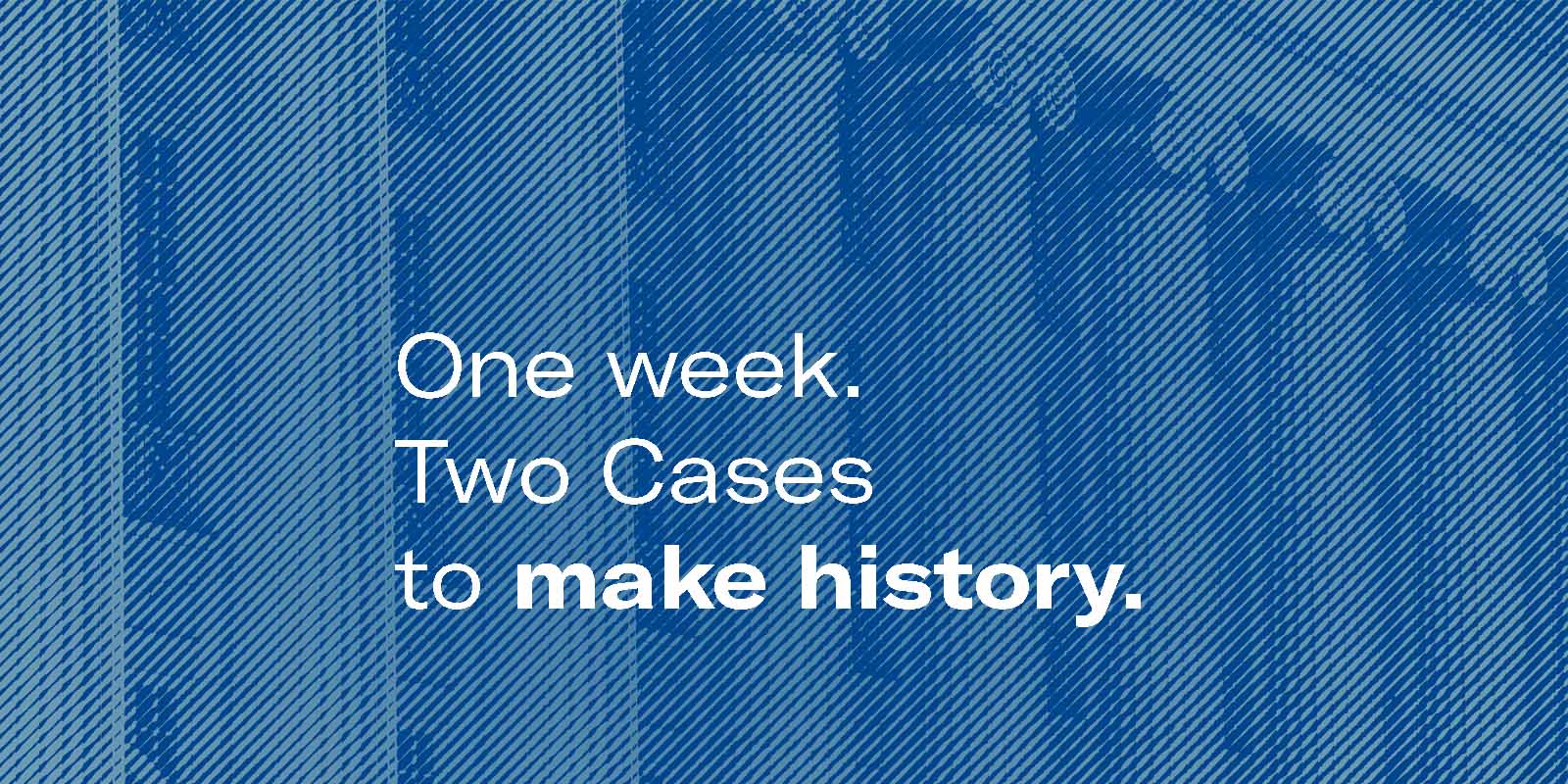I have lived in flyover states my whole life. People tend to overlook the transformational change and creative organizing that happens in the Midwest. But I have known our capacity to show up for justice and equality for years.
I went to law school in Kansas, and I stayed here because of the powerful community I found: organizers and activists who are “Midwest nice,” working tirelessly to make Kansas a more welcoming place for people like me — Black people, LGBTQIA people, and people with disabilities. It was in Kansas that I was able to reclaim my power and become an advocate for racial justice. Today in Wichita, I’m using that power with my colleagues at the ACLU of Kansas and the ACLU’s Capital Punishment Project to bring a constitutional challenge to the state’s death penalty on behalf of our client, Kyle Young.
American Civil Liberties Union
Kansas v. Kyle Young | American Civil Liberties Union
If the death penalty is racist, arbitrary and serves no valid penological purpose, does it violate the Kansas constitution?
In an unprecedented evidentiary hearing, the court will consider a critical question: If the death penalty is racially discriminatory, arbitrary, and serves no valid public safety purpose, does it violate the Kansas Constitution? We worked with a historian and statistical experts to examine how race impacted the development and application of the death penalty in Kansas. These experts will take the stand to illustrate our clear answer to that question — not only is the state’s death penalty is racially discriminatory and unfair; it is unconstitutional.
The Undeniable Line From Lynching to the Death Penalty
Though the modern Kansas death penalty statute was enacted in 1994, the state’s capital punishment system is the legacy of more than 150 years of racial violence against non-white Kansans, especially Black residents.
Kansas became a state through the violent struggle between slavery and abolition. Whether Kansas was to join the union as a slave or free state was put to a vote of residents in the territory. In the lead up to the vote, vigilantes and militias from pro-slavery and anti-slavery camps battled it out, earning Kansas the nickname “Bleeding Kansas.” Ultimately, Kansas joined the union as a free state, and the Civil War started shortly after that.
During the Civil War and after it ended, Black refugees fled the South and crossed the Missouri border into Kansas seeking freedom. Kansas’ growing Black population contributed to racial tensions and fear among many white Kansans, coalescing around the fear of Black men and white women having relationships.
Between 1860 and 1930, 13 Black men were lynched over rape accusations. One historical account found that rape accusations were the third most common reason for lynching.
This includes the 1901 lynching of Fred Alexander, a Black man in Leavenworth, who was accused of raping a white woman. The only “evidence” against him was that a witness heard whistling during the attack, and Mr. Alexander was known to like to whistle. A lynch mob tortured and burned Mr. Alexander at the stake behind the Leavenworth main streets. The state legislature was so horrified that this act of violence could happen in their “free state,” they considered pushing Leavenworth County out of the state and into Missouri.
“As lynchings declined and became less publicly palatable” in the early 1900s, our expert Shawn Leigh Alexander writes, “legislators across the western and southern states began to propose a state sanctioned alternative — a more rigorous application of the death penalty.”
Why the Past Matters
The death penalty is an outgrowth of lynching. The line between the two is undeniable. As was the case with lynching, the death penalty in Kansas is applied disproportionately against Black men, especially when a white woman is the victim.
Our experts’ statistical studies show that in both Sedgwick County (where Wichita is located) and statewide, cases where the victim was a white woman were significantly more likely to be charged with capital murder, compared to cases where the victim was a person of color. In particular, where a Black man is charged with killing a white woman, the likelihood of prosecutors charging the defendant with capital murder, seeking a death sentence, and the death sentence being imposed, is greater than any other defendant-victim racial combination. No white person charged with killing a Black person in Kansas since 1994 has ever been sentenced to death.
No white person charged with killing a Black person in Kansas since 1994 has ever been sentenced to death.
The legacy of lynching and the death penalty is that Black Kansans overwhelmingly do not support the death penalty. However, because Black Kansans — especially Black women — oppose the death penalty, they are disproportionately excluded from serving on capital juries through a jury selection process known as death qualification.
As a result, Black Kansans are denied their right to serve on a jury, basic participation in our democracy. And defendants facing capital punishment are judged not by a jury of their peers, but a jury that is more white, more male, and engineered to favor the prosecution.
No Justification for the Death Penalty
Kansas hasn’t executed a person since 1965. The state’s legislature and governor blocked reinstatement of the death penalty almost 50 times between 1976 and 1994, when it was ultimately passed in the legislature after being heavily influenced by the high-profile murder of a 19-year-old white woman in an affluent Kansas City suburb. There are currently nine people on death row, and three of them are Black.
In a state that has consistently resisted the death penalty — and has so infrequently used it — nothing justifies maintaining a practice born of yesterday’s racial violence and antithetical to today’s racial healing and democracy.
Racial violence wasn’t, and it isn’t, limited to lynching or the death penalty. Black Kansans continue to endure this violence through overrepresentation in the criminal legal system, segregated schools, and segregated neighborhoods that have been intentionally deprived of resources. The death penalty is just the culmination of a system designed to oppress Black people. By challenging it, and ultimately ending it, we will chip away at racial oppression and move toward justice.
Learn more about the death penalty in Kansas below:
This embed will serve content from www.youtube.com. See our privacy statement
DONATE TO THE ACLU
The ACLU has been at the center of nearly every major civil liberties battle in the U.S. for more than 100 years. This vital work depends on the support of ACLU members in all 50 states and beyond.
We need you with us to keep fighting — donate today.
Contributions to the ACLU are not tax deductible.
MORE WAYS TO GIVE
See the ACLU's grade A rating on Charity WatchThe ACLU is an accredited charity approved by the Better Business Bureau
More in Capital Punishment
The Death Penalty Doesn’t Reflect Our National Values. Why is the Biden Administration Still Pursuing It?
The Death Penalty Doesn’t Reflect Our National Values. Why is the Biden Administration Still Pursuing It?
To Root Out Racism in the Criminal Legal System, We Can’t Fear Too Much Justice
To Root Out Racism in the Criminal Legal System, We Can’t Fear Too Much Justice
Missouri is Trying to Bar Me From My Father’s Execution. Governor Parson Must Intervene.
Missouri is Trying to Bar Me From My Father’s Execution. Governor Parson Must Intervene.
The Sinister and Racist Practice Infecting Death Penalty Juries
The Sinister and Racist Practice Infecting Death Penalty Juries
Follow the ACLU on Facebook
Follow the ACLU on Twitter
Follow the ACLU on YouTube
Follow the ACLU on Instagram
© 2023 American Civil Liberties Union
User agreement
Privacy statement
Accessibility
Date
Tuesday, February 7, 2023 - 6:00pm
Featured image
Show featured image
Hide banner image
Related issues
Criminal Legal Reform
Show related content
Tweet Text
[node:title]
Type
Menu parent dynamic listing
Show PDF in viewer on page
Style
Standard with sidebar
Show list numbers
Kansas legislators are going full speed on silencing your voice by constricting your voting rights.
On January 26, the House Elections Committee held a hearing on House Bill 2056, which would drastically—and needlessly—restrict mail-in voting.
Under current Kansas law, every mail-in ballot postmarked by Election Day is eligible to be counted. Our system currently has a 3-day collection period for those ballots to get through the postal system and arrived at the county election office.
HB 2056 would eliminate this collection period, dictating instead that voters try their luck with the postal system to have their ballots arrive by Election Day.
At the bill’s hearing, only one attendee testified in favor of the bill, while one other submitted written proponent testimony; by contrast, there were 25 people who shared testimony against this senseless change.
Despite this clear ratio of opposition, lawmakers are rushing ahead with this devastating bill, rocketing it out of committee toward a general House vote.
Their stated reasons highlight what it means for a group of powerful people to be deeply out of touch with the lives of everyday Kansans. Both their hastiness and their fervor to keep your voice out of the conversation should disturb all of us.
One claim is that voters will lose confidence in the system if votes are being counted after Election Day.
However, if I were a county election official, I’d much rather explain that ballots mailed by Election Day take a few days to arrive to be counted than explain that a person’s vote was thrown out entirely because of a postal process out of their control, even if they did everything right.
Another claim is that the current system is confusing because in-person voting ends on Election Day, whereas mail-in ballots are collected for three more days; the sole in-person proponent said that would create two deadlines for voters to remember. But it wouldn’t.
There’s only one deadline: vote at the polls or mail your ballot by Election Day. Simple. Were this bill to pass, there would suddenly be no deadline, just a shrug by the system. Voters would be left with no more than a wish and a prayer that their ballot arrives by Election Day.
Another fallacy out of the corner of the bill’s supporters is that because the 3-day period doesn’t guarantee a ballot will reach the election office in time, we should get rid of it.
Here’s my analogy for the 3-day period: my house is old, and with the recent polar vortex, it got cold inside. My insulation wasn’t sufficient to ensure I stayed warm. Seeing this, did I remove the insulation I had?
Of course not. I added more because it serves an important purpose. The insulation needed to be made stronger, not thrown away entirely.
Do we get rid of seatbelts because they don’t guarantee maximum safety in every situation? Do we outlaw all medical procedures because some don’t work with perfect efficacy?
If the 3-day collection period doesn’t reasonably assure ballots get through the postal system in time, then we should be looking to extend the collection period (or for that matter, better support our postal service), not trash it.
The motives behind HB 2056 make little sense and of course, there are others with similar reasoning that would unreasonably limit voters from having their voices heard.
HB 2057 is an overreaching law that would restrict Kansas counties to provide only one ballot drop box each. Wrapped in the same irrational rhetoric, this only makes it harder for voters to vote.
Similarly, HB 2053 further takes power away from our counties and gives it to the Secretary of State to needlessly limit voters’ ability to use ballot boxes, allowing a politician in Topeka to decide what’s best for your community.
Lawmakers are justifying voting restrictions by dangerously claiming Kansans have a “personal responsibility” to have their vote counted, wholly ignoring their own role and responsibility in enabling a functioning elections process.
They almost seem to propose that eliminating the 3-day “grace period” would be a favor.
Voting is a right. If you follow the procedures and cast a ballot, your vote should be counted. Period. Votes cast on Election Day are meant to count; the 3-day window to collect those ballots isn’t a “grace period,” but a collection period. Election officials aren’t engaging in charity work for you—they’re ensuring that you are able to exercise your constitutional right to vote.
Kansans deserve to have their voice heard. Voting should be easy, safe, and accessible—not ridiculously made more difficult by politicians in Topeka. If you agree, please tell your lawmaker to oppose HB 2057, 2056, and 2053.
We make it easy with our intuitive form—it automatically finds your lawmakers so all you have to do is fill it out, personalize your message, and hit send.
Date
Monday, February 6, 2023 - 4:30pm
Featured image
Show featured image
Hide banner image
Related issues
Voting Rights
Show related content
Tweet Text
[node:title]
Type
Menu parent dynamic listing
Show PDF in viewer on page
Style
Standard with sidebar
Show list numbers
Author
Jesse Kielman
As we fight for civil liberties in Kansas, we often find ourselves at the crossroads of history—that’s where progress is made.
Next week is a double dose; on Monday we begin two major cases that have deep implications for what we allow from law enforcement and our criminal legal system.
First: we’re putting the death penalty on trial.
We’ll show how the death penalty is arbitrary, racially discriminatory, and unconstitutional.
On Monday, February 6, we begin our case in Wichita—alongside the ACLU Capital Punishment Project and Hogan Lovells US LLP—where we will present groundbreaking evidence that shows the death penalty in our state violates the state and federal constitution in three major ways:
- The jury selection process, known as death qualification, systematically produces white-washed and biased capital juries more likely to convict. It's a violation of the fundamental right to a fair and impartial jury.
- The death penalty has a long, cruel history of being arbitrary and discriminatory imposed—violating the prohibition on cruel or unusual punishment. Though the death penalty is rarely used in Kansas, those who have received it are often victims of racial bias and problematic counsel. You can learn more in the documents section here.
- The death penalty doesn’t deter crime and is extremely costly. With growing concerns about innocence in the process, it's increasingly, fundamentally irrational for the state to have this ultimate power, especially since it fails to meet the standards of constitutional scrutiny.
The Kansas v. Young evidentiary hearing will start Monday morning and will go a few days at the Sedgwick County District Court. We hope you'll to show up to support us as we show the court how the Kansas death penalty is unconstitutional: RSVP here.
Second: It’s time to end Kansas Highway Patrol’s discriminatory practices.
Also on February 6, we begin our case in our suit against the Kansas Highway Patrol, who target motorists with out-of-state plates traveling to and from Colorado for traffic stops and routinely train officers to employ a technique known as the "Kansas Two-Step" to illegally detain and search drivers.
It's been nearly three years of logistical hold-ups since we first filed Shaw v. Jones—finally, our clients will have their claims heard by a jury.
The evidence speaks for itself: Kansas Highway Patrol has and continues to violate drivers' protections against unreasonable search and seizure.
These two cases are historic ones for Kansas.
Both the death penalty and Kansas Highway Patrol’s practices violate our rights—and are demonstrably racist in doing so.
If you wish to be part of this historic moment, please RSVP to the Young case in Wichita. We’re hoping to pack the court to show wide-ranging support for ending this racist practice in Kansas.
Our part in this movement can be arduous but also full of possibility—here’s to hoping next week isn’t just one big step forward, but rather two.
Date
Friday, January 27, 2023 - 4:30pm
Featured image
Show featured image
Hide banner image
Related issues
Criminal Legal Reform
Show related content
Pinned related content
Kansas v. Young
Kansas v. Young Trial Hearing
Shaw v. Jones
Tweet Text
[node:title]
Type
Menu parent dynamic listing
Show PDF in viewer on page
Style
Standard with sidebar
Show list numbers
Authors
Esmie T.
Jesse Kielman
Pages


